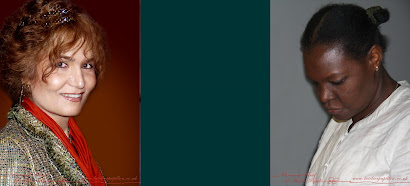
Judge Anver Jeevanjee, National Presedent & Founder of the CDAGM

Parvaneh Farid (Chairperson) & Honorine MacDonald (Hon. Secretary)
Wednesday, 6 August 2008
* Pauline Brandt at CDAG book launch
Subscribe to:
Post Comments (Atom)


Time 12pm (i.e. lunch followed by discussions from about 12:30pm) on Thursday 30th April 2009, to be hosted by ITV Meridian at Arundel Solent Hotel,
The hotel is about one minute’s drive from ITV Meridian’s premises in Whiteley. Their web site is http://www.solenthotel.com
Parking is available
§ To work closely with various sections of the media towards ensuring that they fully and properly reflect the aspirations and portrayal of the visible minorities in every aspect of their composition and delivery, and in a fair and just manner for the multicultural and diverse society of Britain,.
§ To monitor and assist the media on matters relating to the recruitment, retention and employment of its workforce, with a view to facilitate compliance within the spirit of its own standards, public policy and the law.
§ To advise on matters relating to the representation of the culturally diverse audience through the fair portrayal and characterisation of the relevant visible minority communities.
§ To determine and advise on whether the media provides visible minority viewers with any positive role models.
§ To assist in the development of means by which visible minority communities or individuals can be involved in the media.
§ To advise and comment on national and international issues that impact on the condition of all minorities in the South’s region.
JOURNAL OF IMMIGRATION ASYLUM AND NATIONALITY LAW, Tottel Publishing, Vol 22 No 2 2008 at pp 202-203
Diversity in the Media: History of the Cultural Diversity Advisory Group to the Media, 1992-2007,
Compiled by Anver Jeevanjee, Edited by Professor Werner F Menski with the assistance of Ashish Parmar";
Waterside Press (Sherfield Gables • Sherfield-on-Loddon. Hook • Hampshire • RG27 0JG); 176 pages; £18;
Copyright: Anver Jeevanjee 2008; ISBN 9781904380429
Diversity in the Media` is a short catchy title for what, as the sub-title suggests, is essentially a record of the work of the Cultural Diversity Advisory Group over a 15 year period from 1992 to 2007, though it was not formally launched as an organization until 1996. It was founded by Anver Jeevanjee, whose name should be familiar to immigration law practitioners as an independent minded member of the Immigration Appeal Judiciary for some 22 years until 2004. While there he was never afraid to express a dissenting opinion. It is clear that he has brought the same zeal, combativeness and perseverance in leading the fight against unfair or unbalanced portrayal and treatment of ethnic minorities or of issues relating to them in the media in the last two decades.
Starting with concerns over the coverage of BBC South in the early `90s, Jeevanjee and a few other active individuals soon expanded their monitoring and campaigning work to "the then Southern Evening Echo newspaper, Southern TV and other local media in early 1992" and so they came together as a group, motivated no doubt by what he describes in his Introduction as a "lack of racial, historial or geographical awareness amongst the public and more so media staff" which, according to him, "apart from political correctness now... has not gone much further"!
The book is thus a miscellany: a collection of correspondence, emails, policy discussion papers and responses to consultation documents, submissions, reports, press releases, commentaries and observations on a vast range of topics and issues relating to the media`s role, deficiencies and effectiveness in the public sphere, interspersed with biographical sketches or glimpses of some of the key people at the centre of the story narrated in the book. The measure of the group`s endeavours and struggles can be gauged from any number of selected passages from the book. Here is one: "We were quick to complain and criticise when our advice failed to be implemented and if any of the regional bodies would not emulate or discuss some simple ideas on diversity training presented to them" from Australia, Canada or other parts of the world.
The other members of the group or people from within the media world with whom the group interacted and whose views or contributions have been recorded in the book include Pauline Brandt, a former BBC South presenter who has provided a Foreword, and Navdip Dhariwal whose career has progressed from BBC South, where it began, on to its mainstream channel, in the course of which she served until recently as its highly visible South Asia correspondent based in Delhi. The BBC as a publicly funded national institution has of course been the mainstay of the group`s concentrated efforts throughout; this is evidenced by a mass of documented material reproduced or referred to in the book.
From our perspective as immigration lawyers, students, academics or activists, if we can take some comfort from this publication, it is that the path to recognition and acceptance of minority rights and concerns is never easy. The book will serve as a useful reminder and inspiration to those who come after us to continue the fight.
No comments:
Post a Comment